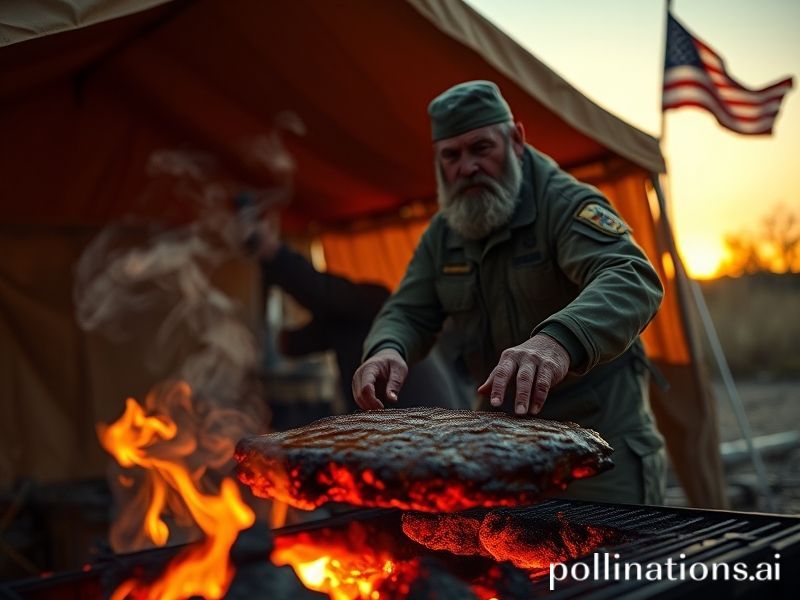Mission BBQ: How Smoked Brisket Became America’s Latest Export of Patriotism and Irony
Smoke Signals from the Suburbs: Mission BBQ and the Global Quest for Authentic Americana
By Dexter “Grill Marks” Malone, Senior Correspondent (and occasional charcoal inhaler)
Somewhere between the strip-mall mattress outlet and a vape shop that promises “discreet shipping,” Mission BBQ unfurls its star-spangled banner of smoked meats like a Pentagon briefing in sauce form. Launched on September 11, 2011—because nothing says “healing” like brisket served with a side of patriotic theater—the chain now boasts 130+ outlets across 20 U.S. states. To the average American commuter, it’s lunch. To the rest of the planet, it’s a cultural Rorschach test dipped in hickory.
Let’s zoom out. In Paris, cafés are rationing butter; in Lagos, jollof rice prices are spiking faster than a Twitter feud; and in Kyiv, restaurants improvise wartime menus that read like survival manuals. Meanwhile, Mission BBQ’s marquee special is the “Fall of the Berlin Wall Pulled Pork,” commemorating 1989 with the same solemnity a frat boy reserves for Oktoberfest. The dish comes with a tiny American flag toothpick—because nothing dismantles authoritarianism quite like vinegar slaw.
The chain’s founders, former Home Depot execs, pledged to “serve those who serve.” Every day at noon, the national anthem blares and every employee freezes like a glitching NPC. International diners have reported fight-or-flight responses; a visiting Finnish diplomat mistook it for an active-shooter drill. Yet this choreographed nationalism is exportable. Franchising rumors swirl from Riyadh to Warsaw: imagine Riyadh’s branch replacing the anthem with a oud rendition, or Warsaw swapping pulled pork for pierogi-stuffed brisket. Globalization, after all, loves a rebrand.
Critics call it “militainment gastronomy,” a phrase that sounds like it was coined at Davos over Wagyu sliders. But the model is shrewd: wrap comfort food in camo netting and watch receipts outperform GDP growth in several NATO countries. In a world where trust in institutions is circling the drain, Mission BBQ sells edible certainty—smoke, salt, and star-spangled reassurance on a sesame-seed bun.
Still, irony drips thicker than their Kansas City sauce. The chain’s brisket is smoked over wood shipped from forests already coughing up beetles thanks to climate change. The napkins trumpet “Made in USA,” yet the cotton is spun in Bangladeshi mills where workers earn less per hour than a side of mac & cheese. And every November 11, veterans eat free—while the company’s private-equity back-end quietly calculates compound annual growth rates. War may be hell, but the margins are heavenly.
From a global labor perspective, Mission BBQ’s kitchen choreography offers a darkly comic case study. Line cooks—many veterans themselves—execute a 90-second brisket slice with the precision of a Swiss watch, only to be reminded by a laminated poster that they’re “defending freedom, one tray at a time.” Compare that to Tokyo’s sushi apprentices who spend a decade mastering rice. Both are rituals, but only one comes with a mandatory pledge of allegiance and a 15-minute break if OSHA isn’t looking.
And then there’s the soft-power angle. The Pentagon spends billions on hearts-and-minds campaigns; Mission BBQ does it with cornbread. Last year the company catered a NATO summit after-party, serving “Coalition Ribs” to defense ministers who only hours earlier debated troop withdrawals. A Lithuanian general was seen licking sauce off his medals—proof that diplomacy sometimes wears a paper bib.
So what does Mission BBQ tell us about the state of the world? That in an era of supply-chain snarls and democratic decay, we still believe salvation can be served on a metal tray. That memory is marketable, especially when glazed. And that somewhere a marketing intern is brainstorming a “Kyiv Kitchen Fire” special for 2024, complete with blue-and-yellow napkins—because nothing is sacred, but everything is smokeable.
In the end, Mission BBQ isn’t just feeding America; it’s franchising its contradictions. And the rest of us—jet-lagged, war-weary, doom-scrolling—line up hungrily, hoping the next bite tastes like something we once called home.







